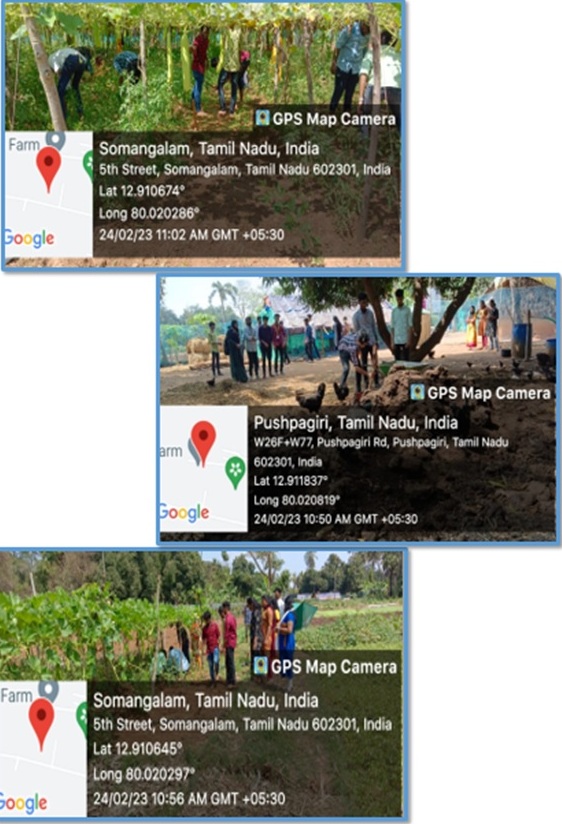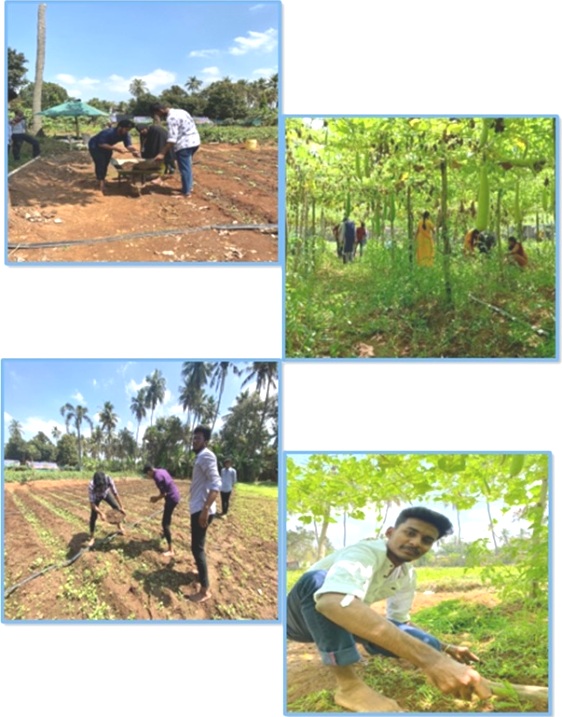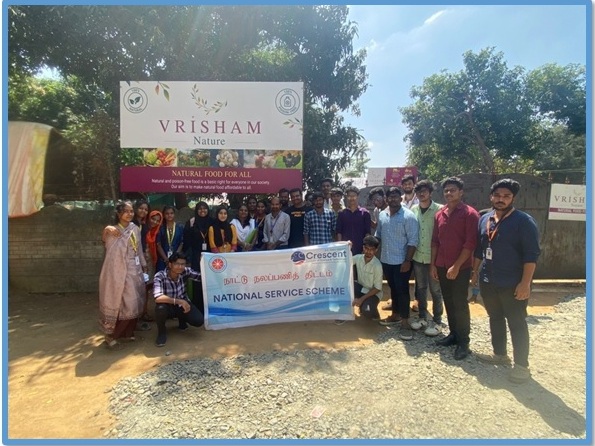Crescent Sustainability Initiatives
CLEAN WATER AND SANITATION (SDG 6)
SUPPORT FOR LOCAL FARMERS: WATER CONSERVATION
On February 24, 2023, the National Service Scheme (NSS) of B.S. Abdur Rahman Crescent Institute of Science & Technology organized a fieldwork initiative to assist local farmers at Pushpagiri Village, Padappai, near Manimangalam. This event aimed to support practical water conservation techniques employed in agriculture, highlighting the critical role that farming plays in sustaining communities. By engaging directly with the farming process, NSS volunteers gained insights into the importance of organic farming and the impact of sustainable practices on local ecosystems.
HANDS-ON EXPERIENCE IN ORGANIC FARMING
During the visit to VRISHAM ORGANIC FARM, NSS volunteers, accompanied by three programme officers, actively engaged in various farming activities. The farm showcased a diverse range of vegetables and greens cultivated through organic methods. The students took part in essential tasks such as weed removal and manure application, providing much-needed support to the farmers. This hands-on experience not only helped the local farmers but also allowed the volunteers to connect with the land and understand the intricacies of sustainable agriculture.
INSIGHTS FROM EXPERIENCED FARMERS
Throughout the day, local farmers Mr Mani and Mr Jana shared their extensive knowledge of organic farming practices and the research that informs their production methods. They explained the Farmer Producer Company (FPC) system, which empowers farmers through collective action and resource sharing. This discussion provided students with valuable context about the agricultural landscape and highlighted the importance of community support in fostering sustainable farming practices.
STUDENTS – FARMERS INTERACTION AND LEARNING
The interaction between NSS volunteers and the farmers was mutually beneficial. While the farmers received assistance in their daily operations, the students gained practical knowledge about agriculture, water conservation, and the significance of organic produce. This educational experience reinforced the idea that active participation in local farming can lead to greater awareness of sustainable practices and the importance of preserving resources for future generations.
CHAMPIONING WATER CONSERVATION OFF-CAMPUS
This initiative exemplifies the commitment of B.S. Abdur Rahman Crescent Institute and its NSS volunteers to support local farmers while promoting water conservation techniques off campus. Through hands-on experience and collaboration with experienced farmers, students contributed to their community and developed a deeper appreciation for the agricultural practices that sustain society. By fostering such initiatives, the institute aims to cultivate a generation of environmentally conscious individuals who understand the importance of water conservation and sustainable agriculture.

Figure VI (5.3) – 1: NSS volunteers engage in organic farming activities at VRISHAM ORGANIC FARM

Figure VI (5.3) – 2: NSS volunteers engage in various organic farming activities, including fieldwork, harvesting, weeding, and irrigation, promoting water conservation and sustainable agriculture practices

Figure VI (5.3) – 3: NSS volunteers from BSACIST gather at VRISHAM ORGANIC FARM, promoting water conservation, sustainable agriculture and community support.
Table VI (5.3) – 1: Students Vounteers List
| S.NO | RRN | NAME | DEPARTMENT |
| 1 | 210071601053 | Fahim ahamed | CSE A |
| 2 | 210071602002 | Alan | CSE A |
| 3 | 210071601111 | Mohamed shafik | CSE B |
| 4 | 210071601125 | Mohammed Hasin | CSE B |
| 5 | 210071601138 | Nivetha.A | CSE C |
| 6 | 210071601152 | R.Ruksaana | CSE C |
| 7 | 210081601042 | Naveeth Ahamed | IT |
| 8 | 210081601006 | Abinash | IT |
| 9 | 210051601023 | Asmaa Areef | ECE A |
| 10 | 210051601032 | Dinakar Reddy N | ECE A |
| 11 | 21005160111 | syed Sameer | ECE B |
| 12 | 210051601067 | Mohammed Afsar | ECE B |
| 13 | 211451601018 | Jai Nandhika | B.Com (Hons.) |
| 14 | 211451601033 | Naveen | B.Com (Hons.) |
| 15 | 211491601059 | Vishwa S | B.B.A (FS) |
| 16 | 211411601036 | Selvaraj. l | B.Com (A & F) |
| 17 | 211291601060 | Mohammed roufiq.t | B.Com (GEN) |
| 18 | 211291601062 | Murali. B | B.Com (A & F) |
| 19 | 211411601025 | Nasrin. K | B. Com (General) |
| 20 | 211291601044 | G. lavanya | B. Com (General) |
| 21 | 211491601647 | Romitha Venkatesan | B.B.A (FS) |
| 22 | 211291601111 | Surthika | B. Com (General) |
| 23 | 211491601005 | Arthi | B.B.A (FS) |
STUDENTS FEEDBACK
1. Fahim Ahamed – CSE A
“Joining the NSS initiative at Pushpagiri Village on February 24 was a transformative experience. Working hands-on in organic farming illustrated the vital role agriculture plays in our ecosystem. By assisting local farmers with tasks like weeding and manure application, I developed a greater appreciation for sustainable practices in farming and how they contribute to water conservation.”
2. Alan – CSE A
“The fieldwork at VRISHAM ORGANIC FARM allowed me to engage directly with agriculture, a critical aspect of community sustenance. Learning from experienced farmers about organic methods and the Farmer Producer Company model enriched my understanding of sustainable practices. This experience emphasized the importance of collaboration between community members to promote environmentally friendly farming.”
3. Mohamed Shafik – CSE B
“Participating in the NSS event was incredibly rewarding. Engaging with local farmers helped me understand the intricacies of organic farming. The firsthand experience reinforced my belief in the significance of water conservation techniques and how our collective efforts can lead to improved agricultural practices.”
4. Mohammed Hasin – CSE B
“The opportunity to support local farmers was a wake-up call for me. Working at the organic farm taught me about sustainable agriculture and the broader implications of our actions on the environment. Gaining insights from farmers about their practices not only impacted my perspective but also inspired me to advocate for sustainable methods in my community.”
5. Nivetha A. – CSE C
“The NSS initiative was an eye-opening experience. I learned the importance of practical involvement in farming and water conservation. Working alongside farmers helped me understand the challenges they face and the sustainable practices they employ. This motivated me to endorse organic farming and support local agriculture efforts.”
6. R. Ruksaana – CSE C
“Being part of the fieldwork was enlightening. I never realized how extensively sustainable farming practices could impact our environment. The experience prompted me to reflect on my consumption habits and encouraged me to promote water conservation among my peers. Understanding the connection between farming and sustainability was truly inspiring.”
7. Naveeth Ahamed – IT
“Working in the fields at Pushpagiri Village was an unforgettable experience. I gained hands-on experience in organic farming which helped me understand the significance of water conservation in agriculture. This event reignited my passion for environmental advocacy, and I feel empowered to make a difference in my community.”
8. Abinash – IT
“The fieldwork at VRISHAM ORGANIC FARM was a powerful reminder of the importance of sustainable practices in our agricultural systems. Learning from local farmers about their methods and the Farmer Producer Company model has sparked my interest in combining technology and farming to create innovative solutions for water conservation.”
9. Asmaa Areef – ECE A
“Participating in the NSS initiative has been one of the most impactful experiences of my academic journey. Working in the fields provided me with a deeper understanding of the relationship between agriculture and water conservation. The knowledge I gained about organic farming will stay with me as I advocate for sustainable practices in my future endeavors.”
10. Dinakar Reddy N – ECE A
“My experience at the organic farm highlighted the essential connection between sustainable farming and environmental health. Learning from experienced farmers and engaging in their daily tasks allowed me to appreciate the hard work that goes into producing food sustainably. It has inspired me to promote eco-friendly practices within my community.”
Water Management and Reuse Policy
Issue: 04; Revised on 2023
| Policy Created on | July 2009 |
| 1st Revision amended on | IQAC Meeting held on 27th October 2017 |
| 2nd Revision amended on | IQAC Meeting held on 31st March 2021 |
| 3rd Revision amended on | IQAC Meeting held on 16th June 2023 |
6.1 STATEMENT OF POLICY
The B.S. Abdur Rahman Crescent Institute of Science and Technology is committed to achieving the following objectives in alignment with Sustainable Development Goal 6 (SDG 6) – Clean Water and Sanitation:
- a) Ensure universal and equitable access to safe and affordable drinking water for all stakeholders.
- b) Provide adequate and equitable sanitation and hygiene for all, with special attention to the needs of women, girls, and vulnerable groups.
- c) Improve water quality by reducing pollution, eliminating dumping, and minimizing the release of hazardous chemicals and materials.
- d) Halve the proportion of untreated wastewater and substantially increase recycling and safe reuse globally.
- e) Substantially increase water-use efficiency across all sectors and ensure sustainable withdrawals and freshwater supply to address water scarcity.
- f) Implement integrated water resources management at all levels, including transboundary cooperation as appropriate.
- g) Protect and restore water-related ecosystems, including mountains, forests, wetlands, rivers, aquifers, and lakes.
- h) Expand international cooperation and capacity-building support to developing countries in water- and sanitation-related activities and programs.
- i) Support and strengthen the participation of local communities in improving water and sanitation management.
6.2 REASON FOR THIS POLICY
The policy aims to provide all stakeholders with adequate water supply, sanitation, and hygiene. It emphasises maximising the collection and treatment of sewage generated and the reuse of treated wastewater sustainably, thereby reducing dependency on freshwater resources. The policy promotes treating wastewater as an economic resource.
6.3 RESPONSIBILITIES
6.3.1 Policy Principles
- a) The campus shall provide adequate water supply and maximize water reuse by adhering to the following principles:
- Equitable access to safe and affordable drinking water for all stakeholders.
- Access to adequate sanitation and hygiene, ending open defecation, with special attention to vulnerable groups.
- Calculation of water usage per person (students, staff, and faculty) annually.
- Improving water quality by reducing pollution and increasing recycling and safe reuse.
- Utilization of recycled/treated wastewater for beneficial purposes, such as irrigation and toilet flushing.
- Implementation of integrated water resources management at all levels.
- Protection and restoration of water-related ecosystems on campus.
- Expansion of rainwater harvesting initiatives.
- Collaboration with government, NGOs, and industries in water-related activities.
- Support for student and staff participation in water management.
6.4.1 Water Reuse Policy Objectives
- Establish a comprehensive policy to maximize water reuse across the university.
- Ensure that all new buildings adhere to water-conscious building standards that facilitate water reuse.
- Implement systems for tracking and measuring water consumption and reuse.
6.4.2 Water Reuse
- Water Reuse Policy: maximise water reuse across the university.
- Water Reuse Measurement: Measure water reuse across the university.
6.5 DISSEMINATION OF POLICY
- a) Display signage promoting water use efficiency across the campus.
- b) Conduct awareness programs at regular intervals to increase water-use efficiency.
- c) Post the policy on the Institute’s website and update it as necessary.
6.6 ENFORCEMENT OF POLICY
- a) The Director (Planning & Development) and Deputy Director monitor compliance and address breaches.
- b) Awareness of the policy among students, staff, and visitors is essential.
- c) Breaches may lead to disciplinary action as per the Institute’s code of conduct.
REGISTRAR


